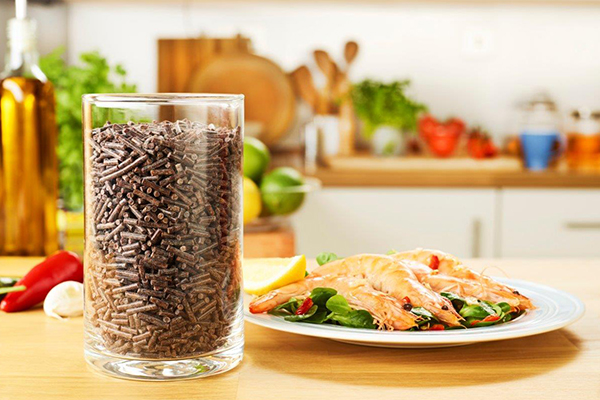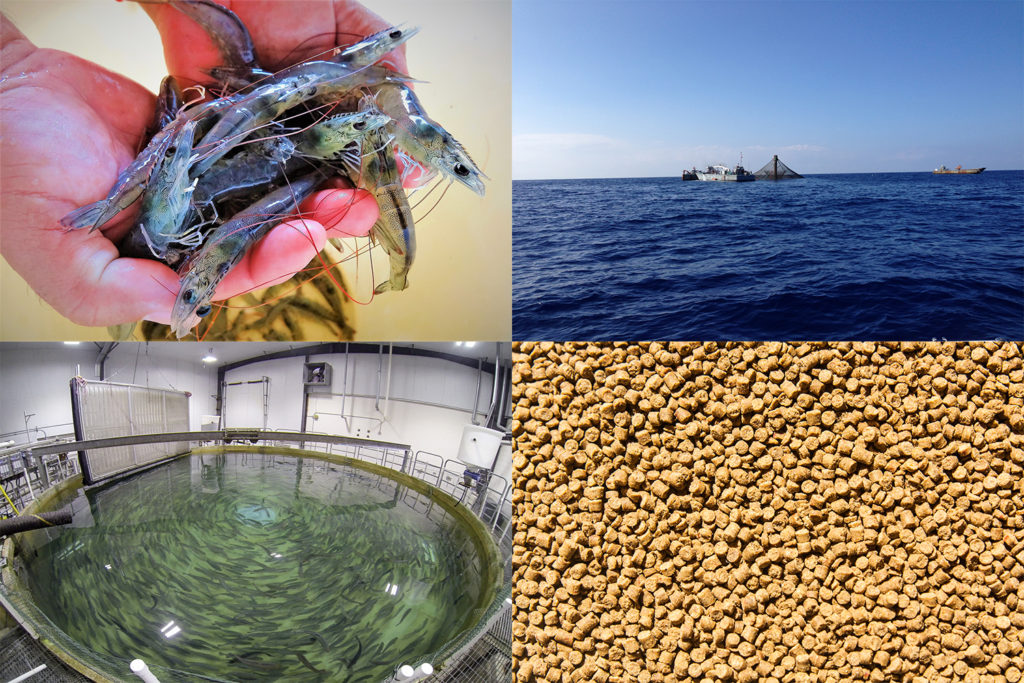Calysta says its single-cell protein can replace fishmeal in shrimp diets entirely

Shrimp feeding trials have shown that novel feed ingredient FeedKind® can significantly reduce the risk of Early Mortality Syndrome (EMS), an infectious disease that has cost the global industry billions over the past decade-plus.
Biotechnology company Calysta’s single-cell protein feed ingredient was evaluated by researchers at Kasetsart University in Bangkok, Thailand, who reported a significant improvement in shrimp immune response to the disease. According to San Mateo, California-based Calysta, researchers reported survival rates of up to 100 percent after 15 days of exposure to the pathogen, compared to 76.7 percent of shrimp that were fed a traditional fishmeal-based diet.
FeedKind protein is produced by fermenting natural gas with a naturally occurring bacteria, using no arable land and little water in its production.
“Outbreaks of disease remain one of the biggest challenges in aquaculture today. EMS, in particular, has caused more than $20 billion in losses to the shrimp industry over the last decade, and disease management and prevention is one of the industry’s highest priorities,” said Allan LeBlanc, VP and aquaculture lead at Calysta. “FeedKind’s ability to activate shrimps’ innate immune system could be transformative for the industry. As a key ingredient in functional feeds, it can form the backbone of a comprehensive disease prevention strategy for farmers, all while improving animal health and increasing yield.”
The study, carried out by Dr. Orapint at the Nutrition and Aquafeed Laboratory at Kasetsart University, is published today in Frontiers in Marine Science. “FeedKind does not inhibit growth performance, feed efficiency, or survival of shrimp,” the study concluded. “Additionally, shrimp in this study demonstrated an increased tolerance to disease when challenged with Vibrio, indicating FeedKind protein may help promote a robust immune response.”
The FeedKind study saw Penaeus vannamei shrimp fed a variety of diets, from a control diet comprised of traditional fishmeal-based feed, to diets with increasing quantities of FeedKind protein to replace the fishmeal; at 33, 66 and 100 percent, respectively, up to a total of 15 percent of feed.
The shrimp then spent 15 days continuously exposed to the causative agent of EMS, Vibrio parahaemolyticus. All shrimp on the FeedKind-based diets showed greater survival rates compared to the fishmeal-based feed, from 76.7 percent in the control diet, to 86.7 percent at 5 percent FeedKind, 96.7 percent in 10 percent FeedKind and 100 percent in the 15 percent concentration.
Calysta said the results show that fishmeal can be entirely replaced in shrimp diets with FeedKind.
Calysta’s joint venture with Adisseo, Calysseo, is in the process of building the world’s first FeedKind commercial production facility in Chongqing, China, with the completion of the first 20,000-metric-ton plant (annual production capacity) expected next year.
Follow the Advocate on Twitter @GSA_Advocate
Now that you've reached the end of the article ...
… please consider supporting GSA’s mission to advance responsible seafood practices through education, advocacy and third-party assurances. The Advocate aims to document the evolution of responsible seafood practices and share the expansive knowledge of our vast network of contributors.
By becoming a Global Seafood Alliance member, you’re ensuring that all of the pre-competitive work we do through member benefits, resources and events can continue. Individual membership costs just $50 a year.
Not a GSA member? Join us.
Author
-
Responsible Seafood Advocate
[103,114,111,46,100,111,111,102,97,101,115,108,97,98,111,108,103,64,114,111,116,105,100,101]
Related Posts

Responsibility
Aquaculture Exchange: Alan Shaw, Calysta
Turn fuel into animal food? Calysta can do that. The California biotech company is now hoping for greater buy-in from aquaculture, its target market. CEO Alan Shaw talks about the potential of FeedKind and its ambitious plans for 2016 and beyond.

Aquafeeds
After testing new feed ingredients, Thai Union finds reluctant uptake
The company has engaged in feed trials with both algae and microbial meals, before its sustainability director said farmers, “by and large, don’t want it.”

Innovation & Investment
Aquaculture is winning, Rabobank analyst explains
Aquaculture is the “winning protein,” according to a new Rabobank report that its author, Gorjan Nikolik, said is intended to draw the bank’s agro-industry clients to opportunities in the fish farming business.

Innovation & Investment
Aquafeed opportunity attracts pioneers from fields afar
As business leaders switch focus from biofuels and energy to food security, one convert dubs the aquafeed opportunity a needed “redeployment” of knowledge.


